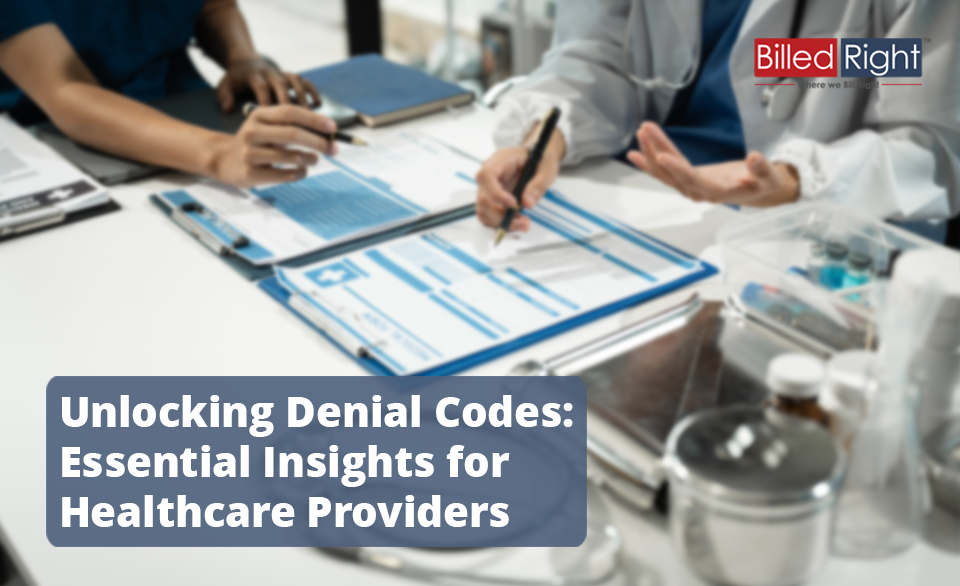Unlocking Denial Codes: Essential Insights for Healthcare Providers

Decoding Denial Codes in Healthcare
Understanding denial codes is essential for healthcare professionals aiming to optimize their revenue cycle. These codes provide insight into why claims are denied and how to improve processes for future submissions.
Importance of Understanding Denial Codes
Denial codes serve as crucial indicators of potential issues within billing and coding processes. By decoding these messages, healthcare providers can pinpoint areas for improvement. Knowledge of denial codes equips professionals with the information necessary to address specific claims effectively.
Table 1 outlines common denial codes and their meanings, illustrating the variety of reasons claims may be rejected.
| Denial Code | Meaning |
|---|---|
| CO-12 | The diagnosis is inconsistent with the type or specialty of the provider. |
| CO-97 | Payment is included in the allowance for another service/procedure. |
| CO-22 | Payment adjusted because this care may be covered by another payer per coordination of benefits. |
| CO-25 | Payment denied. Your Stop loss deductible has not been met. |
| CO-55 | Procedure not covered – Service is deemed experimental |
Understanding these denial codes makes it easier for healthcare providers to implement effective strategies for improvement.
Impact of Denials on Revenue Cycle
Denials can significantly affect the financial health of healthcare organizations. When claims are denied, it disrupts the revenue cycle, delaying payments and potentially leading to cash flow issues. Healthcare professionals must recognize the common causes of claim denials to mitigate their impact.
Table 2 below illustrates how denials can affect various stages of the revenue cycle.
| Revenue Cycle Stage | Impact of Denials |
|---|---|
| Pre-authorization | Increased workloads and extended processing times |
| Claim Submission | Delays in revenue generation |
| Payment Posting | Increased administrative costs and potential write-offs |
| Follow-Up | Resource allocation for appeals and resubmissions |
Focusing on these areas helps in ensuring a smoother revenue cycle and enhances overall financial stability.
By understanding denial codes and their implications, healthcare providers can take proactive measures to reduce denials and improve cash flow management. This knowledge helps in forming a solid foundation for effective denial management and successful claim resolution.
Key Insights for Healthcare Providers
Understanding denial codes is vital for healthcare professionals aiming to optimize their revenue cycle. Familiarity with common denial codes and effective strategies for managing these issues can significantly improve a practice’s financial health.
Common Denial Codes and Meanings
Many denial codes are prevalent in the healthcare industry, each signifying specific issues that need addressing. Below is a table displaying some of the most common denial codes and their meanings.
| Denial Code | Meaning |
|---|---|
| CO-50 | Service not deemed a “medical necessity” by the payer. |
| CO-7 | The procedure/revenue code is inconsistent with the patient’s gender. |
| CO-45 | Charges exceed your contracted/ legislated fee arrangement. |
| CO-96 | Non-covered charge(s). |
| CO-16 | Claim/service lacks information which is needed for adjudication. |
Strategies to Prevent and Address Denials
Addressing and preventing denials requires a proactive approach. Healthcare providers can implement several strategies to improve their denial management processes. Key strategies include:
- Thorough Documentation: Accurate and detailed documentation is critical. Providers should ensure that all necessary information is captured to avoid issues with payers.
- Staff Training: Regular training for staff on billing, coding, and payer policies can significantly reduce errors. Implementing a training program can enhance the team’s understanding of denial management.
- Denial Root Cause Analysis: Identifying the root causes of denials can help in forming effective strategies to improve processes. Providers can perform regular analyses and use the findings to enhance practice operations.
- Automation and Technology Solutions: Embracing technology can streamline the denial management process, reduce manual errors, and improve tracking and reporting.
- Payer-Specific Strategies: Different payers may have unique requirements. Customizing denial management strategies to cater to payer specifics can effectively minimize denials.
By implementing these strategies and being aware of common denial codes, healthcare professionals can significantly reduce the impact of denials on their practices.





